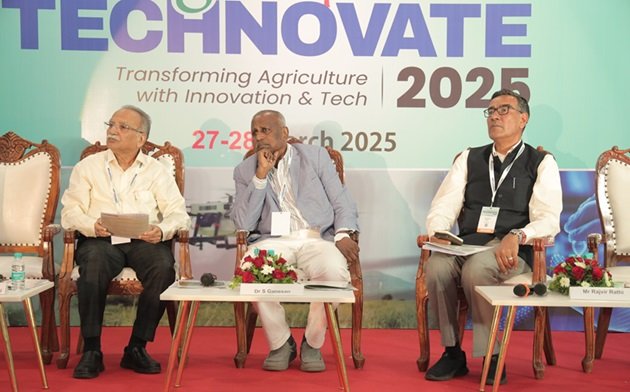Monday, 16 February 2026

Panel discussion on Govt policies & Farmers’ Aspiration to Shape Agritech Landscape
AgroSpectrum Technovate 2025, a premier conference dedicated to exploring the intersection of agriculture and technology, kicked off in Navi Mumbai, today. The two-day event brings together industry leaders, innovators, researchers, and policymakers to discuss and showcase the latest advancements in agritech. With a focus on sustainable practices and cutting-edge technologies, the conference will address the challenges and opportunities facing the agricultural sector in the 21st century.
A panel discussion on ‘Government policies & Farmers’ Aspirations to Shape Agritech Landscape’ on the inaugural day of AgroSpectrum Technovate 2025 was moderated by Dr Sudhir Kumar Goel, Former Additional Chief Secretary of Agriculture and Marketing, Government of Maharashtra. The panellists included Dr S Ganesan, Vice President-Agriculture Policies and Outreach, UPL AG; Rajvir Rathi, Director-Agricultural Affairs & Policy, IM-IBSL Lead-Traits Licensing Business, Bayer CropScience.
Dr Goel started by asking whether government policies are conducive in the agri-tech landscape. While answering about the aspirations of the government, Rathi mentioned three major trends: aggregation and collectivisation, mechanisation and digitalisation. Innovation and technology are the need of the hour for the agri-sector. Whether seeds, fertilisers, irrigation techniques, crop health management, nutrition management, storage, post-harvest, etc, need to be linked to the market demand. We should always remember that a farmer is producing for himself, for the nation and then for exports. A farmer should be provided with real-time data about the prices so that the products can be sold easily.
According to him, the other important thing is to know what is essentially native when a farmer sows seed in the ground till the crop is harvested. Giving information about rainfall and other weather parameters can help in the better management of crops.
Dr Ganesan mentioned that there is a need for a comprehensive understanding of current agricultural practices. He opined that though the current output of Indian agriculture is double that of the US, still India is lagging. The problem lies that the pride of Indian agriculture is missing, and we are shedding tears on farmers earning less, but no one is talking about market access. This is where the need for better access is needed.
He cited examples of how Brazil has been the most successful country in the global export of agricultural products and has access to over 200 countries in the world. He talked about addressing the aspirations and reality in the agri sector. Farmers are the ones who know more than policy makers and agricultural institutions in India, as he mentioned.
All the panellists agreed upon the need for new tech innovations where farmers get the right information. How fast real-time data can be shared with farmers can bring in much-needed change in the agri-sector. The collaboration will help meet the aspirations of the farmers.